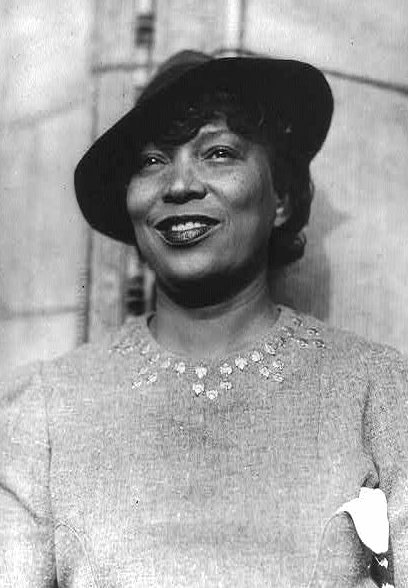Happy Zora Neale Hurston Day!
HAPPY BIRTHDAY to poet, writer, anthropologist, and folklorist Zora Neale Hurston, who used her voice to share the stories of black women in the South and Caribbean, in addition to publishing novels.
Love makes your soul crawl out from its hiding place.
Zora Neale Hurston was born January 7, 1891, in Alabama. Her parents, John and Lucy Ann Hurston, were both former slaves. When she was three, Zora and her family moved to Eatonville, FL, one of the first self-governing, all-black towns in the US.
Hurston considered Eatonville her home, and it serves as the backdrop for many of her stories. In Eatonville, schoolteachers gave Hurston books that “opened her mind” to literature and where black families flourished in the South. Hurston describes her life growing up in Eatonville in her essay “How It Feels to be Colored Me.” (Watch Barnard Sisters read this powerful essay.)
Sometimes, I feel discriminated against, but it does not make me angry. It merely astonishes me. How can any deny themselves the pleasure of my company? It’s beyond me.
While sometimes Zora’s father, a Baptist preacher, tried to “squinch” her exuberant and rowdy spirit, her mother, a teacher, encouraged Zora and her seven brothers and sisters to “jump at the sun.” “We might not land on the sun, but we’d get off the ground,” Hurston explained.
After her mother passed away, Hurston was sent boarding school in Jacksonville, FL. She furthered her education at the high school of Morgan State University-where she claimed to be ten years younger in order to qualify for free tuition- and Howard University, both historically black colleges. At Howard, Hurston co-founded a student newspaper, The Hilltop. Her short stories earned her a scholarship to Barnard College at Columbia University in New York City, where she was the only black student. At Barnard, she studied ethnography (a branch of anthropology where a researcher studies a group). Her teachers and classmates included with famed anthropologists Franz Boas (considered the father of American anthropology) and noted female anthropologists, Ruth Benedict, and Margaret Mead.
Research is formalized curiosity. It is poking and prying with a purpose.
Hurston was the first black woman to graduate Barnard with an anthropology degree. Her studies in anthropology allowed her to study and write about Southern folklore in new ways; she blended her insider knowledge with scientific objectivity. Her education influenced many of her novels.
While at Bernard, and later Columbia as a graduate student, Hurston lived in Harlem, the home of the Harlem Renaissance, a movement of art, poetry, music, dance, and scholarship for black Americans. Hurston befriended Harlem powerhouses, like poet Langston Hughes and singer Ethel Waters. She was said the be the life of the party, although sometimes she would sneak away to write poetry in her room.
It seems to me that trying to live without friends is like milking a bear to get cream for your morning coffee. It is a whole lot of trouble, and then not worth much after you get it.
Although some of her writing was published while she was in school, Hurston’s most prominent works appeared in the 1930s and 40s, most notably Their Eyes Were Watching God and her autobiography, Dust Tracks on a Road. In 1934 she established a performing arts school at Bethune-Cookman University, a historically black college in Daytona Beach, FL. Hurston also served as a faculty member at what is now North Carolina Central University in Durham, NC.
Her life and career faded while she was falsely accused of molesting a child. Despite proving she was out of the country when the incident took place, her reputation suffered. She struggled financially until her death in 1960 and was buried in an unmarked grave.
I do not weep at the world I am too busy sharpening my oyster knife.
Over ten years later, Alice Walker- who recently faced scrutiny for her praise of an anti-Semitic author- designated Hurston’s grave. Walker’s essay “In Search of Zora Neale Hurston,” re-introduced Hurston as a literary hero. Today, Eatonville celebrates Zora Fest annually, her home in Fort Pierce, FL is a national landmark, and an American Library Association Award is named after her, amongst other accolades. In celebrating Zora “Genius of the South” Hurston, authors like Maya Angelou and Toni Morrison rose to prominence.
Today, we wish Zora Neale Hurston happy birthday!
Read “Spunk” by Zora Neale Hurston, published during the Harlem Renaissance.
Order books by Zora Neale Hurston.
Watch Barnard Organization of Soul Sisters read “How It Feels to Be Colored Me.”
Hear “The Life and Times of Zora Neale Hurston.”
Related Reading
Real Life Rad Girl: Diana Vicezar, Mymba Rayhu
